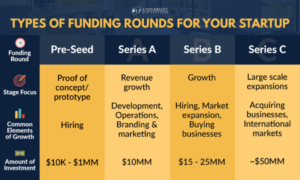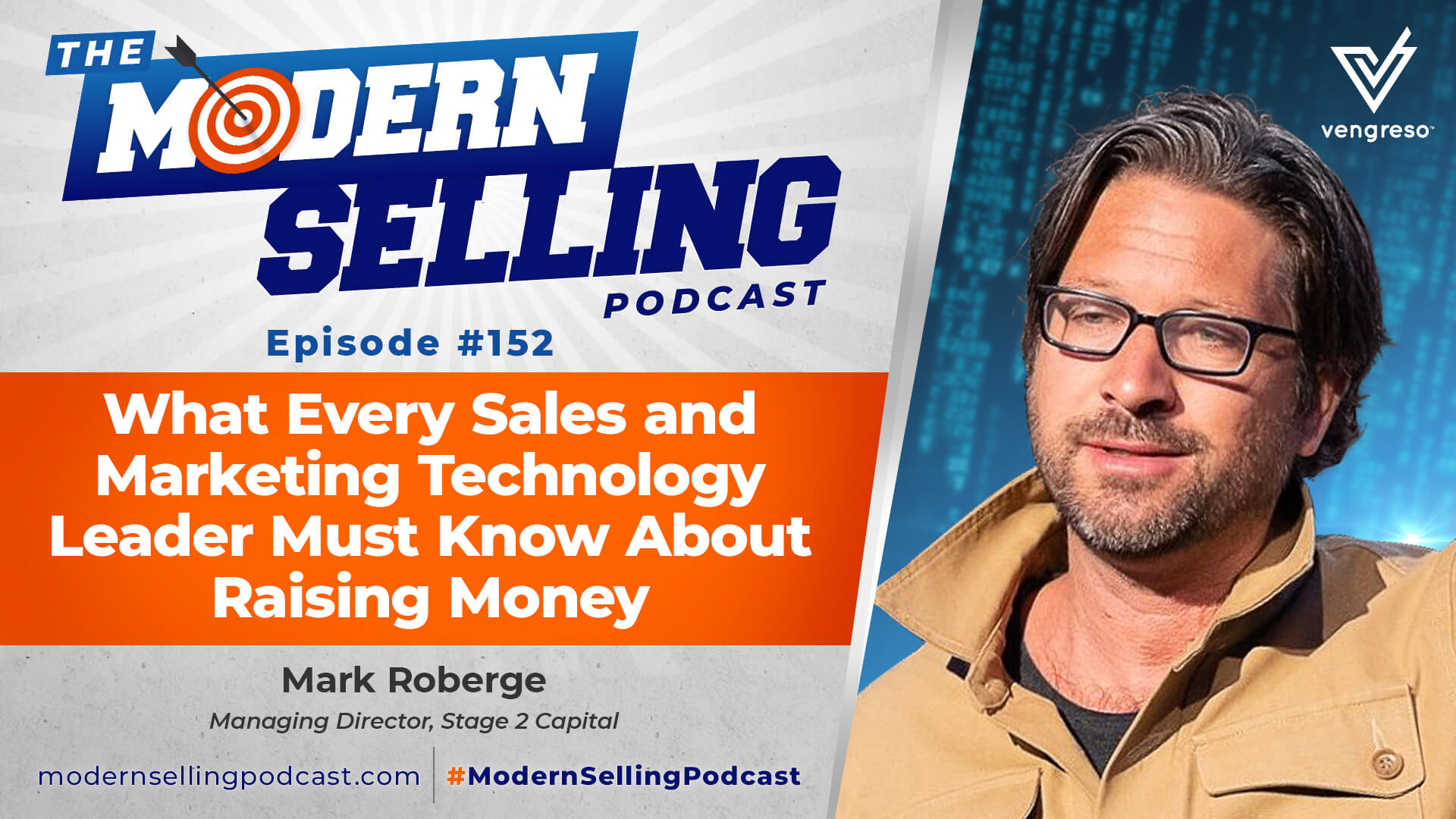If you want to start a business or just take your existing sales tech company to the next level, you may be wondering, should I seek venture capital funding or just do it on my own? In this episode of the Modern Selling Podcast, I talk with venture capitalist and sales and marketing expert, Mark Roberge about how entrepreneurs can get money for their businesses, with a specific focus on tech companies.
Subscribe to Modern Selling on the App of Your Choice!
Mark Roberge is Managing Director at Stage 2 Capital, the first venture capital firm run and backed by heads of sales and marketing. He is also a Senior Lecturer at the Harvard Business School where he teaches courses on sales, marketing, and entrepreneurship.
#Entrepreneurs, learn how to get money for your businesses focusing on tech companies, in this episode of the @GoModernSelling hosted by @GoVengreso’s CEO, @M_3jr and his #sales and #marketing expert guest, @markroberge Managing… Click To TweetPrior to these roles, Mark served as SVP of Global Sales and Services at HubSpot where he scaled annualized revenue from $0 to $100 million and expanded his team from 1 to 450 employees. Mark was ranked #19 in Forbes’ Top 30 Social Sellers in the World. He was also awarded the 2010 Salesperson of the Year at the MIT Sales Conference. Mark received his MBA from MIT.
He has been featured in the Wall Street Journal, Forbes Magazine, Inc. Magazine, Boston Globe, TechCrunch, Harvard Business Review, and other major publications for his entrepreneurial ventures. Mark is the author of the bestselling book The Sales Acceleration Formula: Using Data, Technology, and Inbound Selling to go from $0 to $100 Million.
Join our conversation to learn how tech leaders can get capital funding for their companies.
How Leaders Can Get Venture Capital for a Business
There are many ways to finance a sales tech company or any business for that matter. You can seek venture capital, go to a private equity fund, raise funds for yourself, or just bootstrap your business.
Mark has some great tips for entrepreneurs and sales and marketing technology leaders wanting to know more about funding.
1. Understand the lens of the investor
A big mistake entrepreneurs make at the startup stage is the lack of appreciation for the lens of the investor.
“Just because they are an investor doesn’t mean they can invest in you,” Mark says. “Just because they have money, doesn’t mean they want to give it away.”
For example, many investors will not invest in a pre-revenue state, but only after a company has reached a million dollars in revenue (that is the case for Mark’s firm, Stage 2 Capital).
In fact, investors will do a discovery process of the companies that seek funding, and many times find problems that end up disqualifying them.
So, understand well what the venture capitalists are looking for before asking for money.
2. Understand all the sources of financing available and what is best for you
Mark says that people in the tech industry tend to think that the only way to do a startup is to raise seed capital and then go through funding series A, B, and C, and then double revenue every year until the IPO.

But that’s a minor part of how entrepreneurship is done in America. There are other ways to do business, like franchising or private equity.
Entrepreneurs must understand what is best for them – and it’s not always venture capital. For example, a niche sales software may not be attractive to venture capitalists, but may still be a good business idea.
In this case, the sales tech company may have to be bootstrapped to profitability and then sold to a private equity firm or strategic buyer once they cross $10 or $20 million.
“In this scenario, you could make as much money as with an IPO,” Mark says.
3. Match your strategy and your opportunity with funding
Mark advises entrepreneurs not to talk to venture capitalists too early in the ideation stage. “They are not interested unless you are a serial entrepreneur like Elon Musk.”
Your best bet is to network with wealthy people who make money in your space to see if they are willing to invest in your company. And even if you don’t get money, at least you can get their advice.
Here are some great tips for #Entrepreneurs, #SalesLeaders and marketing technology leaders wanting to know more about funding, in this ep. of the @GoModernSelling w/ the #sales and #marketing expert, @markroberge, Managing Director at… Click To TweetMark says the journey for a typical high-growth software product is something like this:
- They have an idea, then network with people who made money in that area and raise half a million dollars to build the product and run some tests (perhaps even generate revenue).
- Once the product has been tested, they talk to professional seed funds that invest in a lot of companies at the same time. Here they can get $1 million or more.
- The next step is Series A Funding, which has a higher bar because the company must have $2 or $3 million in revenue. This is where many businesses fail because there is a capital gap. Stage 2 Capital accelerates companies at this stage.
What are investors looking for at each stage?
For seed funding, investors look more at the leader than the product itself. They want to see a leader who has the ability to pivot and change, work 80 hours a week under a very stressful environment, that can run agile, has vision for the big opportunity and can lead an engineering team.
Series A investors look at the leader but also at the customers, the economics, the revenue, the product, the competition, any barriers of entry, and also at customer retention.
“Here you need to think about a big enough TAM (Total Addressable Market),” Mark says. “Show VCs a billion-dollar market, or they may not be interested.
Even if you are not there today, tell a good story to show that you will be able to expand, get more revenue and how the product could be applicable to other markets. A big mistake for new entrepreneurs is they don’t get that, they don’t think big enough in terms of the size of the market.”
Another important factor VCs look for is the durable ability for a business to increasingly dominate a market without losing profits to competition. This is known as MOAT. In other words, if your competition can build your unique features in 6 months, then you don’t have a MOAT.
Listen to the episode as Mark shares some examples of great MOATS that sales and marketing technology leaders can leverage in their organizations.
Mark says that at Stage 2 Capital, they do between 30 and 50 hours of due diligence before an investment, spending time with the CEO and the team. He gives them advice and sees if they adopt it and how fast. He also looks at how they lead and how they pitch their story.
The Pitch Deck
What should you include in your pitch deck when presenting in front of an investor?
“You have to be very careful with the first slide to differentiate from the other 100 pitches VCs get,” Mark says. “Tell a story that will get the VC on the edge of his seat, like a patent, special partnerships, the number of downloads you’ve had so far. Don’t spend time talking about your Ivy League school background. Talk about the most important success so far.”
Many entrepreneurs make the mistake of making the presentation just about the product and its features. According to Mark, the product itself and the user interface are not as interesting as the churn rate, how often the product is adopted or even the capabilities of the engineering team. Something to keep in mind when presenting your business model and legal structure to potential investors is how vital understanding that LLC laws differ by state is. This awareness can help tailor your pitch to highlight how your company is positioned to navigate these regulations effectively, further demonstrating your strategic acumen.
#Entrepreneurs, don't make the mistake of creating a presentation just about the product and its features. Learn how to do it better in this ep. of the @GoModernSelling w/ @GoVengreso's CEO and founder @M_3jr and his #sales and… Click To TweetAnother mistake is to make wild long term revenue projections.
“Most VCs don’t care about the five-year financials. They want to know if you have hired a sales rep before, if you have ramped a sales team, if you have a content marketing program for the next year, if you have evidence that your business will scale.”
The following are some slides you can include in your pitch deck:
- Problem and opportunity (where do you fit and what is the problem that you solve)
- Value proposition (how does the product fill that need)
- Your secret sauce (your biggest success so far)
- Market opportunity
- Customer base and churn rate
- Competition
- What is your sustainable defensibility
- Business Model (insights on your CAC or Customer Acquisition Cost)
- Marketing strategy and channels
- Sales strategy
- Leadership (if you have some superstar in your team)
- Financials (what you are doing in the next year, how many reps are you hiring)
Regarding the ask, Mark advises to never ask too little. “Research your VCs, as they may only invest $10 million minimum. So, tell a good story of how you are going to use that amount.”
How Sales and Marketing Leaders can Become Investors
Stage 2 Capital’s mission is to be the first VC fund run by sales and marketing leaders.
“We need investors with a background in sales to help entrepreneurs, because most come from finance and product.”
Two years ago Stage 2 got 97 sales and marketing leaders to join them as investors to help young entrepreneurs.
“So far it’s going well, we are raising money from different investors and are now trying to groom the next round of emerging leaders.”
If you are a sales or marketing leader interested in becoming an angel investor, you can request more information by submitting the form here.
Stage 2 does not only match investors with entrepreneurs but also runs an Investment School to teach investors all they need to know about venture capital.
Listen to the episode to learn more about starting your own investment fund.
Outline of this Episode
- [2:50] About Mark: From Sales Leader to Venture Capitalist
- [7:00] Going big
- [10:00] Mental Health and entrepreneurs
- [17:00] The different types of funding when starting a business
- [27:00] What Venture capitalists look for
- [33:45] What are investors looking for in a leader?
- [35:32] What to include in the pitch deck
- [46:48] How sales leaders can become investors
Resources Mentioned
- Follow Mark on LinkedIn
- Follow Mark and Stage 2 on Twitter: @markroberge @Stage2Capital
- Stage 2 website
- Mark’s book: The Sales Acceleration Formula
- Mark’s favorite movie: Forrest Gump
- Modern Marketing Engine Podcast – Bernie Borges
Connect with Mario!
- www.vengreso.com
- On Facebook
- On Twitter
- On YouTube
- On LinkedIn


